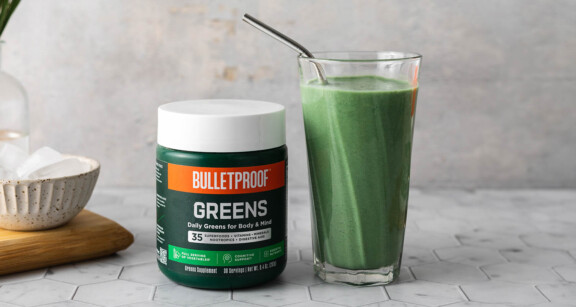Vitamin B12
One nutrient that doesn’t get the spotlight it deserves is vitamin B12. Also known as cobalamin, it is a crucial water-soluble vitamin that plays several essential roles in our body. It is naturally found in common foods you eat and added to others as “fortified” foods. Because vitamin B12 is water-soluble, your body doesn’t store it in large amounts. Rather, it flushes out whatever it doesn’t need.
Vitamin B12 is part of the range of B vitamins. These include thiamin (vitamin B1), riboflavin (vitamin B2), niacin (vitamin B3), pantothenic acid (vitamin B5), vitamin B-6, biotin (vitamin B7) and folate (vitamin B9). Together, they form the vitamin B complex.
Want to know more about why vitamin B12 is so important? Read on to learn about the science-backed benefits of B12, the Bulletproof approach to B12 and how you can incorporate this essential vitamin into your diet.
Why is Vitamin B12 Important?
Vitamin B12 is essential to your health and well-being. It is primarily present in animal-based foods, so vegetarians may experience B12 deficiency. A B12 deficiency can lead to nerve damage. This may manifest as tingling, numbness and coordination difficulties.1 Without an adequate supply of B12, you may also feel persistent fatigue and weakness.2
Some vitamin B12-rich foods include beef, pork, chicken, salmon, oysters, milk, cheese and eggs. Plant-based sources of vitamin B12 include some breakfast cereals, soy and almond milk and nutritional yeast.
Benefits of Vitamin B12
Vitamin B12 benefits your body in many ways, including:
Encourages Energy Production3
Vitamin B12 aids in converting carbohydrates, fats and proteins into energy. Adequate B12 levels can help combat fatigue and increase overall vitality.
Supports A Healthy Nervous System4
B12 may help you maintain a healthy nervous system, as it contributes to the production of myelin, a protective coating around nerve fibers.
Improves Blood Cell Formation5
Vitamin B12 is vital for the formation of red blood cells, which may help to prevent megaloblastic anemia, a condition characterized by enlarged, inefficient red blood cells.
Helps With DNA Synthesis6
B12 is necessary for DNA synthesis, a fundamental process for cell division and tissue repair. This benefit is essential for growth, development and overall tissue maintenance.
Besides these essential functions, scientific researchers continue to discover new and surprising ways that this essential vitamin benefits both body and mind.
The Science-Backed Benefits of B12
Scientific research provides compelling insights on the benefits of vitamin B12 for your body.
Supports Brain Health
A recent study examining the relationship between vegetarians and depression7 found that supplementing with vitamins B6, B12 and folate supported brain health. In fact, the study suggested that taking vitamins B6 and B12 might even affect the brain structure. B12 could be an option to support mental health.
Antioxidant Power
Another interesting scientific research study found that vitamin B12 has the potential to impact several types of inflammatory genes.8 Vitamin B12 is beneficial because it acts as an antioxidant, is widely available at low cost and has an excellent safety profile. B12 could be explored as a complementary treatment to certain health conditions.
Smell
And finally, researchers discovered that vitamin B12 could have a positive effect on patients suffering from olfactory dysfunction.9 Although the mechanism is not fully understood, vitamin B12 seemed to cause improvements in patients who initially lost their sense of smell.
At Bulletproof, we also turn to science to produce our products from start to finish, including our B12 vitamin.
The Bulletproof Approach to B12
We develop our supplements with science-backed ingredients and extensive testing with third-party labs. We don’t leave anything to guesswork to make sure you’re getting the most out of our products.
That’s why our approach to B12 supplements goes above and beyond what you may elsewhere. You can shop confidentially knowing that you are getting high-quality products formulated with integrity.
Vitamin B12, the Bulletproof Way
Our B12 supplement can be a great addition to your routine to support aging. We’ve included methylcobalamin in our supplement, which is the same type of B12 naturally found in your body. Plus, it comes as a refreshing spearmint lozenge to elevate your supplement-taking experience.
Our Supplement Testing Standards
Our products, including our supplements, are made with thoughtfully sourced ingredients that have proven efficacy. Whether you’re addressing a specific health need or want to optimize your mind and body in new ways, our supplements can help you discover what better feels like.
From sourcing quality ingredients to undertaking extensive testing, we take the time we need to ensure you’re getting high-quality products you can count on. We start by determining our formula ingredient and dosage make-ups based on the latest research published in peer-reviewed journals. Then, we work with third-party labs to test our supplements in four stages.
First, we make sure that the ingredients in the formula are present and not diluted. Then, we test for purity. At this stage, we want to ensure there are no harmful contaminants in the product. After that, we examine the amount of active ingredients, to confirm it matches what is declared on the label. And finally, the last step involves composition testing, to make sure the supplement meets all the label specifications. This thorough testing process ensures our supplements are accurately labeled, safe and effective.
Recipes for B12 Foods
Explore our top recipe picks for vitamin B12-rich foods. Incorporate them into your weekly meal planning to make sure you’re getting enough of this essential vitamin.

Why You Should Eat Organ Meat (And How To Make It Taste Good)

Greens Powder Smoothie

Hold the Bun With These Mouthwatering Keto Burger Recipes

Here’s How to Make Your Own Keto Cauliflower Sandwich Thins

23 Easy and Delicious Ground Beef Recipes

Keto Slow Cooker Mexican Shredded Beef

Keto Spicy Tuna Sushi Burrito

Oven Baked Trout With Mustard Glaze

Zoodle Nests With Baked Eggs Recipe
Learn More About Vitamin B12
Vitamin B12 Articles
16 Paleo Foods (That Are Also Bulletproof) to Snag at Trader Joe’s
B12 Deficiency: Signs, Symptoms and Treatment
Can Vegetarians Eat The Bulletproof Diet?
What Is Bioavailability? How to Make Sure Your Supplements Actually Work
Vegetarian Keto: Can Vegetarians Go Keto ?
Natural Energy Supplements: How to Support Your Brain and Body
What Are Brain Supplements? What to Know About Nootropics
Vitamin B12 Recipes
16 Irresistible Keto and Carnivore Meatloaf Recipes: Deliciously Low-Carb and No-Carb Options
Sweet Potato Skins With Rosemary Ground Beef and Avocado
Slow-Baked Salmon and Veggie Bowl
Salmon Protein Bowl With Broccoli and Leeks
Paleo Sweet Potato and Salmon Patties
Wild Baked Salmon With Asparagus & Fennel
Sweet Potato Salmon Avocado Toast
Prosciutto-Wrapped Baked Eggs With Asparagus
FAQs
Common signs of B12 deficiency include fatigue, weakness, numbness or tingling in hands and feet, difficulty with balance and pale skin. Some of these symptoms can also be caused by other medical conditions. If you suspect a B vitamin deficiency, consult with a healthcare provider. A definitive diagnosis can be made through blood tests that measure vitamin B12 levels.
It’s usually best to take B12 supplements with food. B12 is absorbed in the ileum and requires the presence of stomach acid and a protein called intrinsic factor. It’s generally recommended to take B12 supplements with food. Taking them with a meal can enhance absorption and reduce the likelihood of any potential stomach discomfort.
Most people can get sufficient B12 from a balanced diet. Some vitamin B12-rich foods include beef, poultry, salmon, tuna, oysters, milk, cheese, eggs and nutritional yeast. B12 is not naturally present in plant-based foods, so if you follow a vegetarian or vegan diet, you may be at risk of deficiency unless you incorporate fortified foods or take B12 supplements. As we get older, we make less gastric acid, and therefore less intrinsic factor, which results in less B12 absorption. Therefore, as we age, we can become B12 deficient making supplementation necessary. Lastly, if you suffer from a medical condition, consult with your healthcare provider before starting a new supplement.
While B12 supplements themselves don’t typically interact with other supplements, check the overall balance of vitamins and minerals in your supplement regimen. High doses of certain vitamins and minerals, such as folic acid or iron, can affect B12 metabolism. Discuss your supplement regimen with a healthcare provider to ensure it is well-balanced.
Vitamin B12 is generally considered safe when taken in appropriate amounts. It is a water-soluble vitamin, meaning excess amounts are usually excreted through urine. However, extremely high doses of B12 supplements may lead to side effects for some individuals. It’s important to note that the recommended dietary allowance (RDA) for B12 varies by age, sex, and life stage. Consult with a healthcare provider for personalized advice based on your health status and needs.
First, determine the appropriate dose for your needs by consulting with a healthcare practitioner. Explore the different forms of B12 (cyanocobalamin, methylcobalamin or hydroxocobalamin) to determine your personal preference and absorption requirements. Prioritize reputable brands that adhere to quality manufacturing practices and undergo third-party testing. Review the ingredient list for unnecessary additives or allergens and check that the packaging is secure and opaque to protect the vitamin from light. Always verify the supplement’s expiration date.
The recommended daily intake of vitamin B12 can vary depending on factors such as age, sex, and life stage. These recommendations are meant to meet the basic nutritional needs of the general population and are enough to prevent deficiency in most people based on the Dietary Reference Intakes (DRIs) established by health authorities in the United States:
- Infants (0-12 months): 0.4 micrograms (mcg)
- Children (1-18 years): 0.9 to 2.4 mcg
- Adults (19 years and older): 2.4 mcg
Your personal individual requirements can vary and certain factors, such as dietary choices and absorption issues, may require higher intake levels or supplementation. For example, pregnant and breastfeeding women have slightly higher recommended intakes, between 2.6 mcg and 2.8.1011 It’s also important to note that the ability to absorb B12 from food decreases with age, so individuals over the age of 50 may benefit from obtaining B12 from fortified foods or supplements. If you have specific dietary concerns or health conditions, consult with a healthcare provider or registered dietitian for personalized guidance on your vitamin B12 intake.